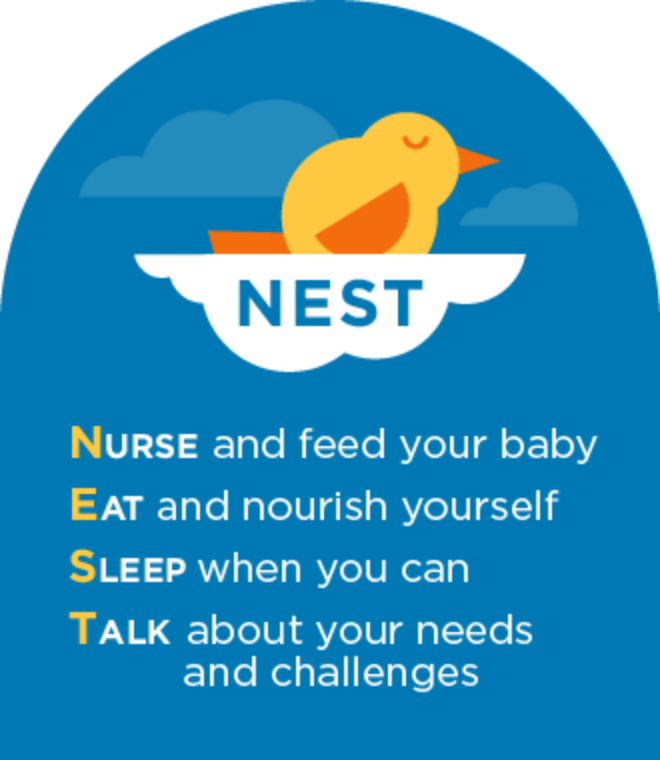
After birth
(weeks 1-12)
Returning home after delivery is a time for you to rest and regain energy while enjoying your baby with your family.
Timely hospital discharge — home visit service
A timely hospital discharge allows you to begin your family life in the comfortable and familiar surroundings of your home. This promotes rest and sleep for you, a more comfortable environment for breastfeeding and bonding with your baby, and greater opportunities for family members to participate in the care experience. You are also less likely to be exposed to hospital-acquired illnesses.
Many members also save money on hospital copays when opting for a timely discharge and complementary in-home nurse visit. Patients identified by their providers as high risk will also receive a home visit.
As a Kaiser Permanente member, if your doctor or nurse-midwife approves, you can enjoy shorter hospital stay after your delivery. In the comfort of your home, a certified registered nurse will provide assessments, breastfeeding support, staple removal, and assistance with any concerns you may have at no additional cost to you.
Adjusting to being at home with your baby
Adjustments in setting up your family’s routine may include reassigning household tasks and encouraging your spouse or support person to take an active role in the baby’s care. You can take measures to make your life easier in the days and weeks after childbirth (the postpartum period):
- Accept help, seek help. You may be exhausted from delivery and from being up at night with your baby. Don’t expect that you’ll be able to keep the house spotless and do all the household errands yourself. Many employers now offer paternity leave to allow fathers to stay at home after a child is born. If not, a relative or friend may volunteer to stay and help out with cooking, cleaning, and running errands. Allow your friends to bring you meals or do chores if they offer.
- Limit visitors. Everyone will want to see the baby right away, just when you’re at your most tired. It’s okay to limit visitors to as few as you feel you can handle, or to ask them not to visit for a while. It’s also okay to set a limit on how long they stay.
- Get extra rest. Newborns wake frequently and are often up a lot during the night. Sleep when your baby sleeps. Even a short nap helps. If you breastfeed, learn how to collect and store some breast milk so that your partner or babysitter can feed the baby while you sleep. Because both you and the baby have to learn how to breastfeed, you may want to wait a few weeks before you start pumping breast milk.
- Eat well. Good nutrition is key to regaining your strength and health. Focus on eating a healthy, well-balanced diet. Continue to take your prenatal vitamins for as long as you are breastfeeding your baby or for at least 6 weeks if you are bottle-feeding. If you are breastfeeding, you may need to eat 500 additional calories a day over your pre-pregnancy diet. This is the time you are truly “eating for two.” Most women who breastfeed can eat a healthy diet and still lose weight.
- Drink extra fluids. Drink at least an extra 5 cups (1183 mL) to 8 cups (1893 mL) of non caffeinated liquids each day to stay well-hydrated, especially if you are nursing. Drinking extra water is often necessary to help you maintain a healthy milk supply. A good rule to follow is to have a glass of water each time you nurse.
- Limit or eliminate alcohol. An occasional glass of wine or a cocktail is okay now. But remember that the alcohol can collect in your breast milk and pass to your baby, so don’t overdo it. Waiting to have a drink until after you breastfeed will reduce the amount of alcohol that goes into the milk.
- Feel good about yourself. Don’t focus on the fact that you haven’t immediately returned to your pre-pregnancy shape or clothes. Buy something new that looks good, even if it’s not your old size. Get someone else to watch the baby long enough for you to spend some time on yourself.
- Personal hygiene. Bring your peri bottle (plastic squirt bottle) home from the hospital and you can continue to rinse your perineal area with warm water each time you use the restroom. If you have stitches, make sure you pat the area dry after rinsing. Warm sitz baths can also be helpful. If you had a cesarean delivery, you will want to keep the incision area clean and dry. When you shower, you can gently clean around the incision area with warm soapy water, rinse well, and pat dry with a clean towel.
- Nothing in the vagina for 6 weeks. To prevent infection and allow yourself time to heal, it is important that nothing goes in the vagina for 6 weeks. This means no sex, no douching, and no tampons.
- Vaginal discharge. For a few weeks after delivery, your vaginal discharge will change from bright red, to dark, then white. Seek medical advice if you are passing blood clots larger than a quarter, your discharge has a foul smell, you are saturating more than 1 pad an hour for 4 hours, or if you have a fever higher than 100.4ºF.
- As soon as you feel able, you can begin to take short walks with your baby. Do not engage in strenuous exercise until you have been cleared by your provider at your 4- to -6-week postpartum checkup.
- Get support. Talking to other new mothers can help when you have general questions about being a new mom. Your local doctor’s office, hospital, or community centers may have support groups or offer classes for new moms. Online support groups on social media can also be helpful.
If you have problems such as fever, pain, bleeding, depression, or general postpartum questions, contact us right away. Advice nurses are available by phone 24 hours a day at 404-365-0966.
Baby blues or postpartum depression?
The changes you go through after having a baby can leave you sad, anxious, afraid, or confused. These feelings are sometimes called the “baby blues,” and they’re quite common. In fact, about 8 in 10 new mothers experience some form of baby blues — usually during the first 2 weeks after delivery.
Postpartum depression is more serious and can last a year or more if untreated. There’s no single cause for it, but the physical, hormonal, and emotional changes that go along with childbirth all play a role. Just like we did during your pregnancy, we’ll check in with you often to see how you’re feeling.
Some common symptoms of postpartum depression include:
- restlessness, irritability, or sadness
- difficulty sleeping, extreme exhaustion, or both
- difficulty concentrating, remembering, or making decisions
- feeling overwhelmed, inadequate, guilty, or worthless
- excessive anxiety or worry
- losing interest in activities you used to enjoy
If this sounds like what you’re going through, speak with your doctor or call the Health Line at 404-365-0966 right away. You’re not alone — many moms struggle with postpartum depression, and there are treatment options that have been shown to help.

Call the Health Line 24/7
If you have problems such as fever, pain, bleeding, depression, or general postpartum questions, contact us right away. Advice nurses are available by phone 24 hours a day at 404-365-0966.

Focus on nesting
Having a baby is a healthy, normal event in life. Your goal for the weeks after you deliver is to NEST. The best place to nest is often in the comfort of your own home.
Resources
How to reach us
Need to make an appointment with your care provider? Feeling something unusual or like you’re going into labor? Want advice about breastfeeding? We’re here for your call.

